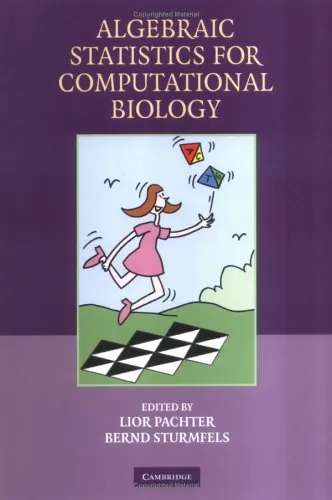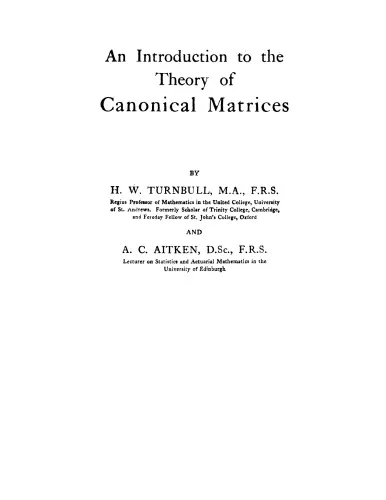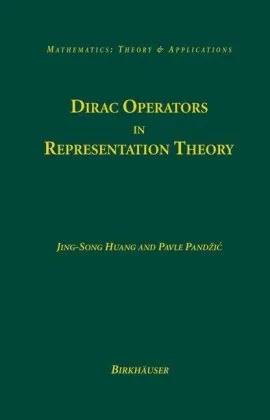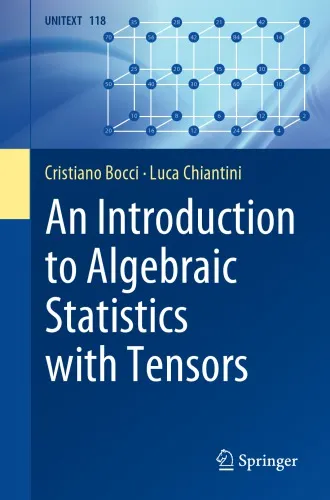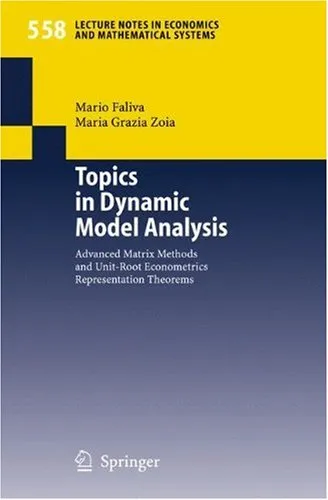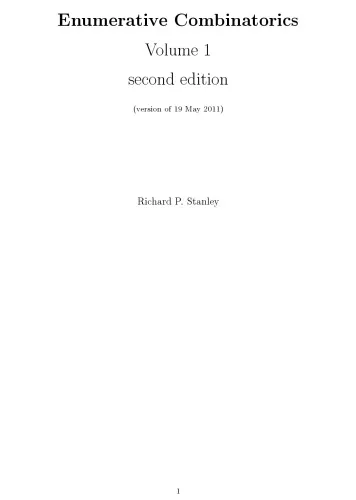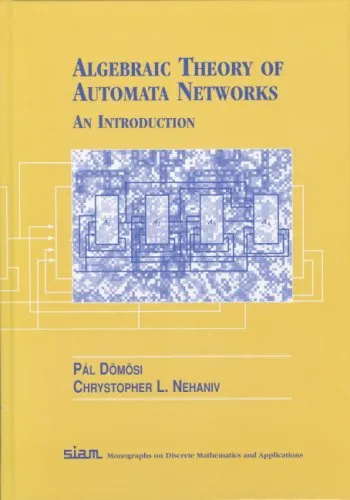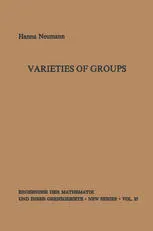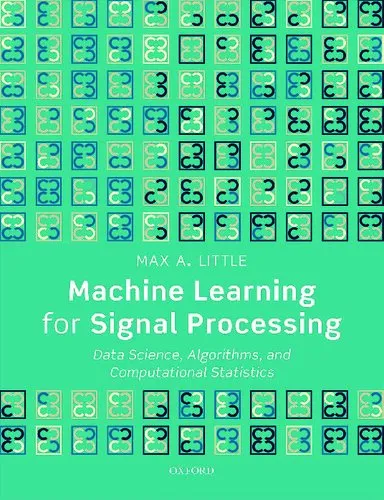Algebraic Statistics for Computational Biology
4.5
بر اساس نظر کاربران

شما میتونید سوالاتتون در باره کتاب رو از هوش مصنوعیش بعد از ورود بپرسید
هر دانلود یا پرسش از هوش مصنوعی 2 امتیاز لازم دارد، برای بدست آوردن امتیاز رایگان، به صفحه ی راهنمای امتیازات سر بزنید و یک سری کار ارزشمند انجام بدینکتاب های مرتبط:
معرفی کتاب «Algebraic Statistics for Computational Biology»
کتاب «Algebraic Statistics for Computational Biology» نوشتهٔ مشترک L. Pachter و B. Sturmfels، اثری جامع و برجسته در تقاطع ریاضیات، آمار و زیستشناسی محاسباتی است که به بررسی کاربردهای آمار جبری در تحلیل دادههای زیستی میپردازد.
خلاصه جامع کتاب
کتاب «Algebraic Statistics for Computational Biology» اثری نوآورانه است که مفاهیم پیچیدهٔ Algebraic Statistics را برای حل مسائلی در حوزهٔ Computational Biology به کار میگیرد. هدف اصلی این کتاب ارائهٔ ابزارها و روشهایی برای بررسی ساختارهای دادهای پیچیده و مدلهای آماری پیشرفته است که در تحلیل دادههای مربوط به ژنومیک، پروتئومیک و سایر زمینههای زیستشناختی نقش کلیدی دارند.
نویسندگان در این اثر، نحوه استفاده از تکنیکهای جبری مانند Grӧbner Bases و Varieties را به مسائل آماری زیستشناختی مربوط میسازند. همچنین، در هر فصل استفاده از مفاهیمی مانند Maximum Likelihood Estimation (MLE) و Probabilistic Models توضیح داده میشود. مثالهای عملی و کاربردی از دادههای بیولوژیک در کل کتاب گنجانده شدهاند تا خواننده بتواند ارتباط مستقیمی بین تئوریها و مسائل واقعی پیدا کند.
یافتههای کلیدی کتاب
- آشنایی جامع با مفاهیم Algebraic Statistics و کاربردهای آن در مدلسازی آماری.
- بررسی عمیق مدلهای Probabilistic Graphical و ارتباط آنها با دادههای بیولوژیکی.
- مفاهیم اساسی مانند Grӧbner Bases و استفاده از آن در محاسبات زیستشناختی.
- ارائه روشهای جدید برای مطالعه ژنومیک و دادههای RNA-Seq.
- استفاده از مدلهای جبری برای کاهش پیچیدگی الگوریتمهای زیستشناسی محاسباتی.
نقلقولهای مشهور از کتاب
"Algebra provides a bridge between the discrete and continuous worlds of biological data."
"The interplay of statistics and algebra revolutionizes data analysis in computational biology."
چرا این کتاب اهمیت دارد؟
اهمیت این کتاب نه تنها در کاربرد آن در زیستشناسی محاسباتی بلکه در پیشرفتهای تئوری نیز نهفته است. این اثر نشان میدهد که چگونه آمار جبری میتواند راهحلهای جدیدی برای چالشهای پیچیده در دادههای زیستی ارائه دهد. کاربردهای عملی و گستردهٔ مطرحشده در این کتاب آن را به منبعی ضروری برای پژوهشگران در زمینههای Bioinformatics، Computational Biology و Mathematical Statistics تبدیل کرده است.
علاوه بر این، ساختار ساده و منظم کتاب باعث میشود که حتی خوانندگانی با پیشزمینههای محدود در Algebra و Statistics بتوانند مفاهیم اصلی را درک کنند و از آنها در تحقیقات خود بهره ببرند. ترکیب دقیق نظریه و عمل، سطح بالایی از درک و آموزش را فراهم کرده و این کتاب را به ابزاری موفق در حل مسائل مدرن تبدیل نموده است.
Introduction to "Algebraic Statistics for Computational Biology"
Welcome to "Algebraic Statistics for Computational Biology," a pioneering work at the intersection of mathematics, statistics, and computational biology. Written by Lior Pachter and Bernd Sturmfels, this book introduces readers to the innovative field of algebraic statistics and its transformative applications in biological data analysis. By merging abstract algebra, combinatorics, and probability with cutting-edge techniques in genomics, the work opens new pathways to solving complex computational problems in biology. Whether you are a mathematician, biologist, or computer scientist, this book demonstrates the power of interdisciplinary approaches in addressing the challenges of modern science.
Detailed Summary of the Book
The book serves as an introduction to the burgeoning field of algebraic statistics, a discipline that employs tools from polynomial algebra to develop statistical models. This is particularly relevant in computational biology, an area where data sets are increasing dramatically in size and complexity. "Algebraic Statistics for Computational Biology" takes a deep dive into key topics, including phylogenetics, genome analysis, and gene expression studies, all while grounding these applications in a rigorous mathematical framework.
Chapters systematically explore mathematical machinery such as polynomial rings, algebraic varieties, and their intersections with probability distributions and statistical models. The authors carefully balance theory with concrete examples, ensuring accessibility while maintaining precision. Throughout the book, computational techniques such as Gröbner bases and numerical algorithms are illustrated in the context of their practical relevance to biological questions. From analyzing evolutionary trees to modeling gene regulation networks, the book is a compass for researchers navigating the intricate landscape of biological data.
What sets this book apart is its commitment to bridging abstract mathematical concepts and real-world biological applications. Each chapter concludes with problem sets and suggested readings, encouraging readers to deepen their understanding and apply the ideas to their own research problems. By the end of the book, readers will be well-equipped to appreciate and contribute to the ongoing synthesis of algebra, statistics, and computation within the life sciences.
Key Takeaways
- Foundational Concepts: Learn the basics of polynomial algebra, algebraic geometry, and their relevance to statistical modeling.
- Practical Applications: Discover how these mathematical tools can be directly used to solve problems in phylogenetics, genomics, and biological network analysis.
- Computational Techniques: Gain insight into effective algorithms such as Gröbner bases, and understand their utility in biological data processing.
- Interdisciplinary Focus: Understand how to integrate algebraic methods with biological insights and computational strategies.
- Problem-Solving: Develop skills to approach and address open questions in computational biology using innovative algebraic techniques.
Famous Quotes from the Book
"The polynomial equations of algebra articulate hypotheses about the structure of biological systems, connecting abstract mathematical ideals to empirical observations."
"Algebraic statistics represents a paradigm shift in the analysis of biological data, revealing hidden geometries within the complexity of life."
Why This Book Matters
The significance of "Algebraic Statistics for Computational Biology" lies in its ability to connect disparate disciplines to tackle pressing scientific challenges. With the explosion of data in biology—from genomics and transcriptomics to proteomics—traditional statistical methods often fall short of capturing the complexity of these systems. Through a fusion of algebra and computation, the book provides researchers with a robust mathematical framework to uncover patterns and structures otherwise hidden in biological data.
Moreover, this book represents a bold and visionary response to modern scientific needs. By extending analytical tools from pure mathematics to applied biological research, the authors illuminate the profound interplay between theory and practice. This interdisciplinary dialogue is crucial for enabling insights that are both broad in impact and deeply rooted in mathematical rigor. For students, researchers, and professionals alike, "Algebraic Statistics for Computational Biology" is not merely a textbook—it is a call to participate in the revolutionary convergence of mathematics and biology.
دانلود رایگان مستقیم
شما میتونید سوالاتتون در باره کتاب رو از هوش مصنوعیش بعد از ورود بپرسید
دسترسی به کتابها از طریق پلتفرمهای قانونی و کتابخانههای عمومی نه تنها از حقوق نویسندگان و ناشران حمایت میکند، بلکه به پایداری فرهنگ کتابخوانی نیز کمک میرساند. پیش از دانلود، لحظهای به بررسی این گزینهها فکر کنید.
این کتاب رو در پلتفرم های دیگه ببینید
WorldCat به شما کمک میکنه تا کتاب ها رو در کتابخانه های سراسر دنیا پیدا کنید
امتیازها، نظرات تخصصی و صحبت ها درباره کتاب را در Goodreads ببینید
کتابهای کمیاب یا دست دوم را در AbeBooks پیدا کنید و بخرید
1411
بازدید4.5
امتیاز0
نظر98%
رضایتنظرات:
4.5
بر اساس 0 نظر کاربران
Questions & Answers
Ask questions about this book or help others by answering
No questions yet. Be the first to ask!
